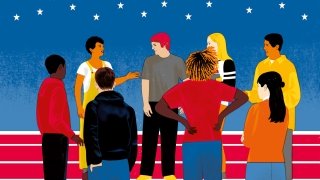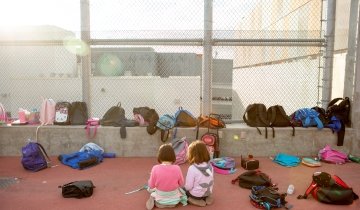In a survey conducted last September, the Pew Research Center found that nearly 60 percent of Americans who speak about politics with those they disagree with reported the conversations as “stressful and frustrating.” It’s hard to recall a time when the thought of talking politics or any subject deemed divisive—from mask mandates to what books are taught in schools—could create such anxiety.
Democracy, however, is born from the fruitful discussion and exchange of ideas. How then can we encourage political discussion and civic engagement in a way that doesn’t cause undue stress and, at the same time, help bolster the very ideals upon which our nation was founded?
In 1916, John Dewey wrote, “Democracy has to be born anew every generation, and education is its midwife.” A new initiative from the USC Rossier School of Education, the Democracy Project, aims to course-correct, with a mission to strengthen students’ knowledge, skills and capacities so that they can become engaged citizens in their communities.
The project, co-chaired by Professor of Clinical Education Jenifer Crawford and Professor of Clinical Education Robert Filback, is in its strategic planning phase. Since the fall, the duo has been conducting extensive listening sessions with teachers, district leaders and community organizers, working together to consider ways to leverage existing educational materials. Their goal is twofold: They want to make these resources easy for civics educators to use in their classrooms, and they want to align these resources with criteria required for the California State Seal of Civic Engagement, a new award unveiled in 2020 that aims to incentivize students to become informed and active citizens.
“There are a ton of great materials,” Crawford says. “Teachers don’t just want more resources. They want resources that are going to help students achieve [the seal]. We’re trying to bring all these existing resources together, and [put them] in a framework that is user-friendly and aligned with [the seal].” They also want to go about the process in an equitable way, “centering equity and inclusion in the process,” Crawford says.
As they create this package of course materials, they will turn to the wealth of material generated by other USC entities, including the USC Center for Political Futures and the USC Shoah Foundation. Another resource partner is the Constitutional Rights Foundation.
They also plan to facilitate a series of “learning exchanges,” where key stakeholders—teachers, parents, students, superintendents and other community members—gather to discuss the guiding question, “What does democracy look like to you?” Through the learning exchanges, Filback says, they aim “to give [participants] something tangible, particularly in this very fraught time that we’re in, where so many discussions around school are politicized.” The exchanges will also offer opportunities for information gathering, which Filback believes will help shape how and what educational resources are included in the course package.
A recent grant from the Stuart Foundation has provided funding for a project specialist, held by Robert Medrano EdD ’20. Medrano, a social studies teacher at Culver City Middle School, completed his dissertation research on effective civics instructional practices for 12th-grade Latinx students. Medrano is working with Crawford and Filback to develop a civics course model, and he hopes the project will provide students with “increased opportunities to engage in relevant and meaningful learning experiences that lead to greater political efficacy.”
An internal and external advisory board will be guiding the project as it moves from its planning and implementation phase. Internal board members include professor Akilah Lyons-Moore, who was involved in early project planning, as well as additional USC Rossier faculty members: Shafiqa Ahmadi, Melanie Kneece Calvert, Paula Carbone, David Cash, Zoë Corwin, Julie Posselt, Artineh Samkian and Julie Slayton. External board members include Kamy Akhavan, executive director of the USC Dornsife Center for the Political Future; William Deverell, USC Dornsife professor of history; Michelle Herczog, a history and social sciences consultant for Los Angeles Unified School District; Michael Matsuda, superintendent of Anaheim Union High School District; Natalia Molina, USC Dornsife Distinguished Professor of American Studies and Ethnicity; and Dan Schnur, USC Annenberg professor.







